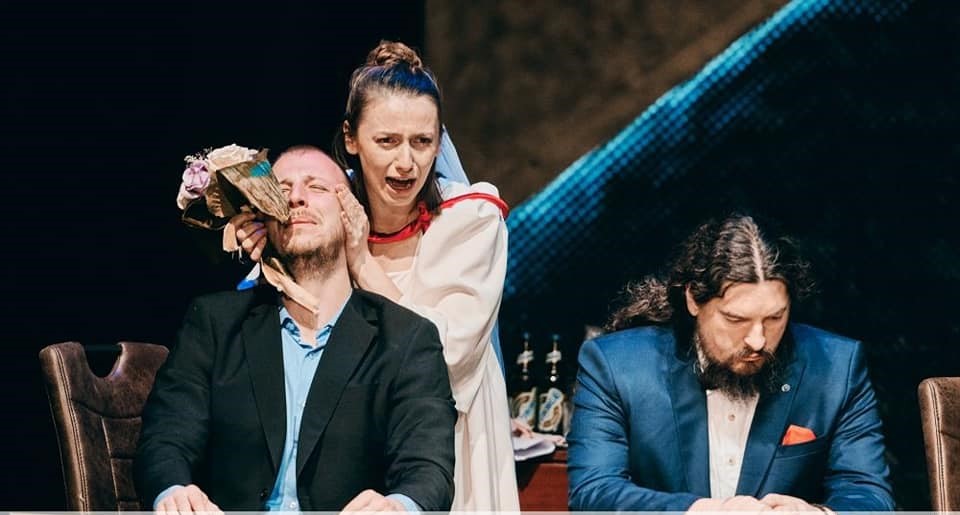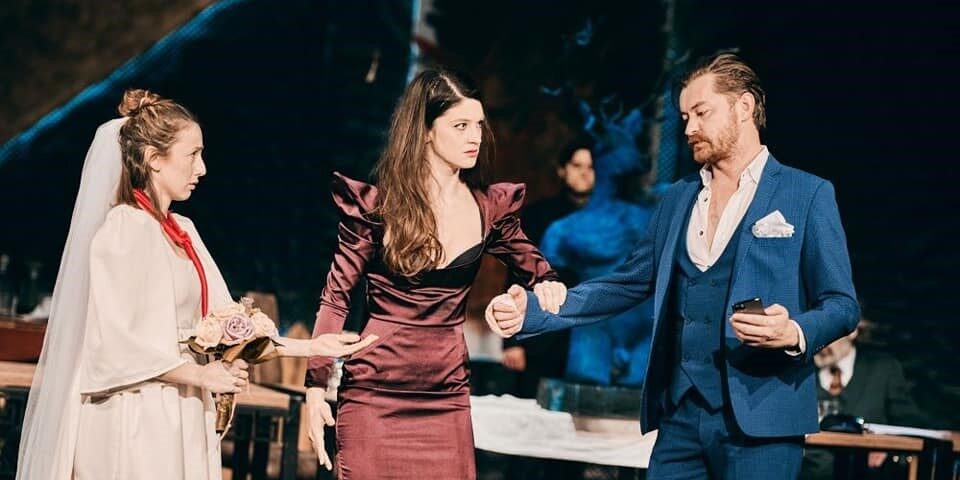Korifej Teatar (visiting BITEF Teatar, 3rd February, 2023)
What is it that kills the humanity in people and makes them capable of spilling the blood of their own children? Director Zoran Rakočević’s adaptation of Euripides’ Iphigenia, produced by Korifej Teatar and presented at BITEF as part of independent scene month) opens up a large number of moral questions by placing the mythical story of the sacrifice of Iphigenia in a modern social context.
It’s an atmospheric and lively production, full of both external and internal conflict, that holds the audience’s attention from the beginning and doesn’t let go.
At the start, the actors lie on the floor completely naked. They are woken from their dreams by a spotlight and as they dress, they assume their roles. Agamemnon (Đorđije Tatić) and Menelaus (Petar Novaković), the great Greek military leaders here clearly represent those power in modern society, and are similarly oblivious to the fact that they are only human. Agamemnon is portrayed as a man torn between the role of commander and father, however very quickly he falters in his parental vocation and surrenders to his love of power. His role as the father to Iphigenia is overshadowed by his identity as a leader; in him are united all the things necessary for the doom of humanity.
The scenography, by Rakočević, Ivanka Vana Prelević and Jelena Simić, is relatively sparse. There are only a few pieces of furniture on stage: tables, chairs and drinks carts, from which the actors pour for themselves during the play, toasting their immoral decisions and downing their bottles and glasses. Music plays a central role in the production. The actors are either singing lullabies about death or screaming about death into the microphone. Guitar accompaniment, both sentimental and aggressive, helps create the illusory view of a world that is cruel to the extreme.
In Clytemnestra, played by Jelena Đukić, two forces clash, but in the end evil prevails. In the middle of the play, she appears on the stage together with Iphigenia. Realizing that she has led her daughter to death (in a wedding ceremony that transforms into a sacrificial ceremony), she desperately tries to save her, both as a mother, and someone who is aware of the situation. As played by Đukić, she is sober, but also warlike, confronting everything that Agamemnon and his closest soldiers represent. However, in the moment when she is left alone in her desire to save Iphigenia, she gives in and votes for the death of her own daughter. Her values crumble under the influence of those in power. This adaption does not offer heroes who persevere beyond human weaknesses, but the opposite – in a world where power means everything, there is no place for morality and humanity.
Moamer Kasumović’s Achilles is, like Agamemnon, representative of a class of ignorant rich people who do not care about anything other than their own prosperity. He has no identity of his own. Throughout the play, Kasumović walks around in high-heels and does not take them off, although his face reveals that he is not comfortable wearing them.

Ifigenija at BITEF Teatar
Rakočević’s use of modern props, including a microphone, a cell phone and a plastic doll, is often funny. The scene when Agamemnon is on the phone, receiving his prophecy, causes laughter to ripple round the auditorium. The painful squeal of the microphone amplifies the chill caused by Agamemnon and Menelaus’ words. As Iphigenia is sacrificed, we are forced to observe the abuse of a plastic doll. In this way the modern world penetrates this story from antiquity and draws out the universal character of the performance.
When Anđelija Rondović initially appears on stage as Iphigenia, she is spirited and happy. With she learns of her destiny, she becomes a figure filled with fear and disbelief. In her attempt to find out the reasons for her sacrifice, she is stunned to learn how little her life means to the people in power. As she delivers her monologue, suffering is visible on her face and sarcasm is evident in her speech; in this way, she succeeds in leaving everybody else on the stage speechless. Rondović manages to portray the deepest levels of human pain and suffering in a play which otherwise showcases narcissistic people incapable of empathy. As she removes her red blindfold, she transforms from a playful, naive girl into the embodiment of suffering. After she speaks, everyone on stage is embarrassed, their eyes fixed on the ground. However, although they may be internally questioning their own actions, nothing changes: everyone sticks to their decisions.
The act of Iphigenia’s sacrifice is not shown on stage. She is taken away and those who took her return with her blood spilling everywhere and smeared over everyone’s faces; in this way they become literally marked by their own actions.
An anti-war theme runs through this adaption. It tries to reveal the absurdity of war through individual statements which are steeped in sarcasm. The issue of nationality is also subtly explored, echoing through the shouts of the choir: The barbarian is a slave, the Greek is free! The way which women’s life is regarded in the play is captured in the moment when someone says that the “life of one solider is more important than the lives of a thousand women.”
In the end, it becomes clear that Iphigenia has been judged, not by an oracle, but by human cruelty and greed. Before the lights go out, we get the exclamation ‘Na Troju’ (“To Troy”) as the cycle of violence continues.
Credits:
Director and adaptor: Zoran Rakočević//Music: Bojan Peko Minić//Scenography and costume:Zoran Rakočević//Scenography and costume assistants: Ivanka Vana Prelević, Jelena Simić
Cast: Anđelija Rondović, Jelena Đukić, Đorđije Tatić, Petar Novaković Moamer Kasumović, Una Lučić, Ognjen Sekulić, Bojan Peko Minić
Producer:
NVO “Korifej teatar” Kolašin
Further reading: Zlatko Paković, Pasolini and the Performance They Tried to Ban
Mirela is a student of comparative literature at the University of Belgrade. Since 2020, she has been writing literary criticism for the Bookvica.net. She is a lover of books, theatre and rainy fall days.








